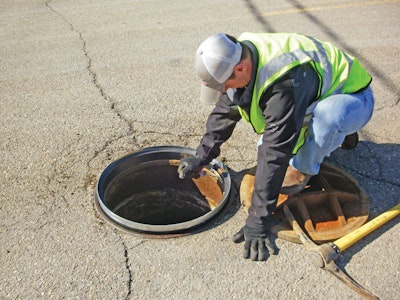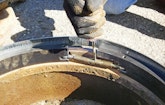
The Illinois Department of Transportation approved the use of adjustable riser rings as a better solution when raising utility and manhole rims to grade after pavement lifts.
As road surfaces age, deteriorate, and go through resurfacing cycles, maintaining manholes and keeping them at the proper grade becomes increasingly difficult.
Nearly 20 years ago, the Illinois Department of Transportation approved the use of adjustable riser rings when raising utility and manhole rims to grade after pavement lifts. Formal language describing acceptable riser rings was soon included in Illinois DOT’s continually updated Standard Specifications for Road and Bridge Construction — for example, the April 2016 version says:
“… the adjustment of frames and grates may be accomplished through the use of adjusting rings that fit on top of the frame. These adjusting rings shall be fabricated as a one-piece assembly from gray iron, ductile iron, or structural steel. They shall provide a structural capacity equal to or greater than the existing frame and shall not affect the opening size or surface appearance. The rings shall have a device for positively positioning and fastening the ring to the existing frame to prevent movement under traffic.”
Formal approval by the Illinois DOT was significant for Chicago because it cleared the way for widespread use of adjustable risers in Illinois’ largest city and metro area.
“We want contractors in the city to be using quality materials, and the SSRBC is one of the sources we use to define what good solutions really are,” says Cindy Williams, quality assurance manager for the Chicago DOT. “And generally speaking, quality risers that fasten securely to frames are a good idea — they’re not appropriate in every situation, but where they can be used, they should be used. They allow for a less invasive solution and are better for our roadways.”
Williams believes that cuts in the pavement should always be avoided when possible, and in the case of manholes, this view is supported by a 2004 Kansas City study, titled A Look at the Effect of Manholes on Street Condition, by Steve Rinne. The study concluded that pavement was three times more likely to be rated bad around uneven manholes, compared to even manholes. In other words, precisely matching grade and avoiding excavation and patching when raising manholes to grade is a good strategy for extending the service life of new pavement.
In the city of Milwaukee, cast-iron manhole risers were causing problems and on occasion had become a liability.
“They’re usually fine, but on occasion, they would slip or rattle out, and that led to car damage and claims. There was definitely room for improvement,” says Samir Amin, P.E., Milwaukee’s engineer in charge.
Amin organized a pilot project using the Pivoted Turnbuckle Manhole Riser from American Highway Products as an alternative. “We picked a street that’s near our municipal yards, a street that sees a lot of heavy truck traffic,” he explains. “We set several of the adjustable risers there and just watched over time. They handled heavy loads and there were no failures or slips, so we were convinced that they would work better than the nonadjustable risers that were being used.”
The galvanized steel risers are precisely sized to order. Using a screwdriver as a lever, the turnbuckle transmits thousands of pounds of force to the flexible rim, seating the riser into the original utility rim securely. Installation typically takes five minutes or less, and risers connect tightly around their entire circumference, like a pressed-in bearing.
Based on their success, Milwaukee wrote specifications for riser use that required adjustable risers with a mechanism similar to the pivoted turnbuckle. That was about four years ago, and the results have been good.
“At the very beginning, we faced some resistance from contractors who were used to the readily available cast-iron risers,” Amin says. “But really, that went away quickly, and now nobody mentions it.”








